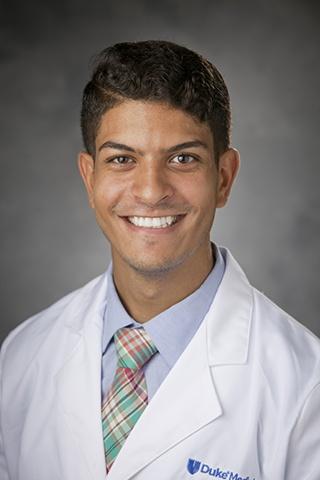New year, new resolutions
Twelve months ago, I interviewed at Duke Family Medicine, a residency program completely out of left field for me. Entering into the interview season, I had initially hoped to match with a large, inner-city program with an inpatient service, located in the northeast. But six months later, I found myself in a small program with an outpatient focus, located in a small city in the south, ironically my first choice.
In my time with the Duke Family Medicine Residency Program, the same core principle that drives me and the reason I fixated on being a resident here has become apparent: advocacy.
Ad-vo-ca-cy: (noun) the act or process of supporting a cause or proposal
Neutrality as a default
I recently came across a statement made by Desmond Tutu: “If you are neutral in situations of injustice, you have chosen the side of the oppressor. If an elephant has its foot on the tail of a mouse and you say you are neutral, the mouse will not appreciate your neutrality.”
I feel that neutrality has become a default for many of us, both inside and outside of medicine. We become neutral about our bodies and find ourselves years down the road with multiple ailments and unhappy.
We become neutral about our passions because society has told us that what we should be working toward is a stable, settled adulthood, one that’s foundation is often unsettled by our deepest passions.
We become neutral when we see poverty, homelessness, food instability, lack of access to education, etc. We choose to sit among friends contemplating how sad these issues are before going back to our homes, only to go about our same passionless, stable business the next day.
I feel like I have been trained to lose my voice.
The strength of a physician’s voice
These past six months at Duke, though, have shaken me. I have met colleagues and mentors who challenge me to look beyond the four walls of our clinic to see the abundance of injustice faced by the people we daily serve.
I came here because this program’s goal is to create leaders in population health and as leaders, also advocates. Advocates for people and everything that affects them.
I entered primary care because I believe in the strength of a physician’s voice for his or her patients, their communities and for this country. I believe that the issues that plagued our communities in 2015 are all results of years of neutrality and lack of advocacy, years of oppression.
So I say, “No longer!” My new year’s resolution is to be an advocate. And what is my cause? Relationships: the substance of society, the essence of community.
When we stop trying to develop relationships (with ourselves, with each other, with our communities), I think we have no one to blame but ourselves for the deterioration of our society and our standards for health, wellness and the pursuit of happiness.
My advocacy goals for 2016
One of my advocacy goals for this year includes fostering a better relationship with myself and my health.
The American Heart Association recommends 30-40 minutes of moderate-intensity physical activity on most days of the week for primary prevention of cardiovascular disease, while the 2015 Dietary Guidelines Advisory Committee identified healthy dietary patterns that unanimously include high vegetable and fruit content and low red or processed meats, sweetened foods and refined grains.
Another of my goals is to be a more present and active member in my community by attending public forums, bringing awareness to discrepancies in our health systems and their effects on the communities they serve, engaging in legislative advocacy with the North Carolina Academy of Family Physicians and at the national level, and participating in the 2016 election process for the next president of our country, which includes doing my due diligence in researching the positions each candidate takes on issues that are important to me and knowledgeably voting in November.
I think the flavor of each person’s advocacy goals, including my own, will likely and naturally change with time and experience but I plan on reminding myself daily of the need, nonetheless, to respectfully express satisfaction and dissatisfaction with status quo and to remember that if I’m not part of the solution, I’ve become part of the problem.
I invite you to join me in making 2016 a year of relationships, a year to be an advocate, a year to free the oppressed mice in and around you.
Sam Fam is a first-year resident with the Duke Family Medicine Residency Program. Email samuel.fam@dm.duke.edu with questions.
Editor’s note: Duke Family Medicine residents guest blog every month.
